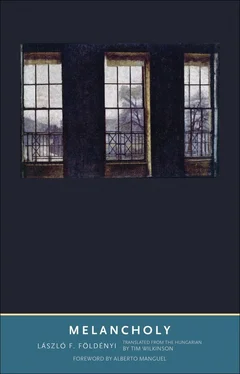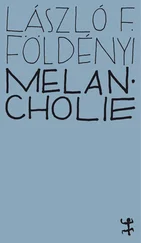Grace presupposes faith — seen from the position of solitude, however, faith takes on the form of a command. For that reason, the flight of a recluse from grace is a flight from external commands, which can be regarded as insisting on one’s freedom. That freedom consists of a denial of faith; but since for the Middle Ages, living under the spell of a horror vacui as it was, what was denied was just as much an emanation of God’s existence as what was accepted (even sin exists only because God exists); therefore, denial on the part of an abandoned medieval melancholic was essentially directed at an affirmation of nothing . God cannot be denied, because God is present even in that denial; existence cannot be denied, because existence itself is a precondition for denying existence; one cannot deny oneself, because even the ultimate gesture of suicide is carried out by a “superego” in the Christian sense. There is no ultimate denial extending to everything — merely a desire to deny. Yet the nothing that this desire confronts is not nothing, since simply by asserting it one is asserting its existence. Thus, denial, seeking an object in its desire for freedom, is compelled to affirm — to affirm nothingness. Which means that deniers strive to assert the absolute validity of all the things that cause their sense of loneliness. The outcome is the deification not just of the individuality of the body but also of the soul, and consequently of the uniqueness of life.
In stepping outside the order created by reason, passions tend toward sin; within that order, they tend toward virtue, teaches St. Thomas. Sin implies a rejection of the Christian interpretation of existence conceivable by reason, and thus, in the final analysis, it goes hand in hand with a loss of grace. Since the time of St. Augustine, intentionally shutting oneself up and turning away from God ( aversio a Deo ) has been regarded by Christian theology as a major sin. A sinner rejects grace, slumps into loneliness, and, as has been seen, becomes a prisoner of melancholia. Anyone who is melancholic steps out of the rational order created by reason and therefore, as measured by medieval standards, can in no way be considered wise. (In writing about melancholia, scholars fall into a deep hush about the Aristotelian notion.) Since melancholics can only long for metaphysical solitude, they are prisoners of that longing. It has no object, and therefore it falls back on itself: the self begins to fantasize, to imagine things, and it takes an inward turn that can be seen only as pathological. True wisdom is not touched by sickness, the Middle Ages vow (first, St. Augustine in his work De beata vita ), but the antique meaning of apatheia is altered, with less emphasis given to the stoical overcoming of the passions and more to the mind’s self-control. Anyone who fails to observe that is sick in the eyes of the Middle Ages. “So pleasant their vain conceits are,” the Robert Burton writes about melancholics, “that they hinder their ordinary tasks and necessary business, they cannot address themselves to them, or almost to any study or employment” (Burton, Anatomy , partition 1, sec. 2, member 2, subsec. 6, 246). The black bile rises to the opening of the liver, thence to the heart, and its final destination is the brain, Constantine the African writes; the black bile that makes its way to the brain dulls the powers of judgment. Melancholics are overcome by undue fright and imagine that “the sort of thing is occurring which will never occur in reality.” The mind becomes deranged and incapable of getting its bearings in a familiar world. “As with the sun, which loses its light if clouds or vapors reach it, so too the mind of a sick person becomes deranged if the noxious vapors of black bile reach him; he is unable to shine any more, and he does not recognize things according to their inner reality” (quoted in Heinrich Schipperges, “Melancholie als ein mittelaltlicher Sammelbegriff für Wahnvorstellungen,” 728). A melancholic is alienated from everything, said Constantine, who considered melancholy to be both a corporeal and a mental illness, since in his view, fantasizing too was an illness. The medieval world ejected from itself all imaginings, yet it is questionable whether everything that a system seeks to eject can be adequately characterized by the word “sickness.” Naturally, the exaggerated fantasizing of a medieval melancholic was sick, since, after all, it was corroding the body of a healthy society, but — and this is where the melancholia of the Middle Ages was one step ahead — those who called melancholia an illness did not inquire into the question of health itself. Ulysses crossed the Strait of Gibraltar, the boundary laid down for mankind, and that was why, in Dante’s opinion, not only was his flight wild ( folle volo — Inferno , canto 26, l. 125), but so, too, was he himself ( Paradise , canto 27, l. 83). The limits imposed are those of God, and we should know our limits. The boundlessness of a melancholic, his longing to be negative, was, according to the contemporary conception, sick, irrational, and contradictory to all the rules of reason. “In melancholy persons,” writes Avicenna, “the vividness of the imagination ( imaginatio ) of depressing things itself causes them to appear, because the thing whose image is represented to the mind is already there in actuality. . We find that the understanding is drawn away from rational actions by the senses and by the phantasy” (quoted in E. R. Harvey, The Inward Wits , 26). Melancholics, he writes elsewhere, are “usually sad and solitary, and [they are] continually, and in excess, more than ordinarily suspicious, more fearful, and have long, sore, and most corrupt imaginations” (quoted in Burton, Anatomy , partition 1, sec. 3, member 1, subsec. 3, 402). Melancholia is a product of a sick fantasy — sick, because it does not recognize generally agreed boundaries. According to Avicenna’s doctrine, imaginatio is the store-house of sense perceptions, whereas the vis imaginativa is the faculty that mobilizes the collected sensory data. A healthy imagination is not free, but subordinate to the senses; perception itself, however, is of a lower order than thinking— cogitatio —which alone leads to God; and if imagination, in its attempt to break loose from this hierarchy, tries to acquire autonomy, it becomes sick ( morbus imaginationis is the frequent accusation laid against melancholics).
The cause of fantasizing, of the roving imagination, was not merely noxious vapors of black bile rising to the brain; it also stemmed from an elemental human need. A person longs for solitude and at the same time is fearful of it. He can be rid of God’s omnipotence only by elevating himself into an absolute. This, however, is just as depressing a state as God’s solitude, which no crafty philosophy is capable of resolving. Seen from the outside, an individual who longs for freedom is daring and self-confident; naturally, in the eyes of the age his fantasizing is sickly, but there is determination and resoluteness behind this sickness. He of course sees the situation differently. Rebelling against divine omnipotence, he wishes to grant individual things, retrieved from under the authority of the general, their own ultimate justification, subject to no one’s backing. This entails that he absolutize himself as ultimate certitude. The rejection of grace and the choice of freedom is madness in the eyes of the outside world, and the individual who chooses to act like that is truly mad: his desire to understand himself, the individuality and irreplaceability of the self, forces him to return to the question of being, which, in turn, lands him back with God. He is forced to realize that he does not have even himself at his own free disposal — and experiencing that can truly drive one mad. He cannot change the fact that he was created , and the fantasizing, which is essentially aimed at turning himself into a creator, comes to nothing: he becomes unintelligible, muddled, crazy. An inner derangement is inevitable for anyone wishing to cut himself free from God: the desire for freedom plunges the desirer into madness. He will be branded by others as a madman, and they have every reason for doing so: the culture around the melancholic — Christianity — produces the possibility of endless freedom (that is, sin) only to suppress it in madness and transform it into the greatest possible servitude , into self-slavery. “One cannot sufficiently condemn Christianity for having devaluated the value of such a great purifying nihilistic movement, which was perhaps already being formed. . through continual deterrence from the deed of nihilism , which is suicide” (Nietzsche, The Will to Power , 143). This inseparable intertwining of the possibility of freedom and servitude brings about an inner breakdown (most people writing about melancholia in the Middle Ages list symptoms that are used to characterize schizophrenia nowadays), and in the case of melancholia, that condition is degraded into a mental illness. From the early Middle Ages, indeed from the early days of Christianity, physicians (Soranus of Ephesus and Caelius Aurelinus) and thinkers considered it to be a mental illness, which embraced everything from schizophrenia to manic depression or, to narrow the range, from rabies to lycanthropy. The interpretation of existence inherent in antiquity’s notion of melancholia thereby lost its validity, but its medieval career had not yet come to an end. Melancholia was born originally out of a profound longing for freedom, a longing that was condemned to die from the start. The medieval interpretation of existence, however, in consequence of its totalitarian nature, not only bound the desire for freedom hand and foot but also, by declaring it to be a mental illness (or making effectively mentally ill those who had started to doubt), managed to exploit melancholia for its own glorification. Anyone who wanted to oppose the scheme of existence, to transgress the boundaries that had been laid down, would truly become sick — and what could serve as a better proof of the viability and vigor of a system? The Christian mystery was a unique event, the beginning and end of which are known, and for that reason, there is no scene in this world that does not have a prescribed place in that drama. The medieval view, like the teachings of Greek mythology, associates every type of mental illness, thus melancholia as well, with the night (the symbolic creatures of which include the owl and the bat). Night in the Christian sense — unlike the notion in antiquity — does not allow a glimpse of a new world that has never been seen before; instead, it is darkness taken in the strictest sense of the word. (Naturally, that does not apply to mystics, who were on intimate terms with melancholia.) To express this in the language of mystery: night was the era without Jesus Christ (Romans 13:12), which would pass soon so that the faithful might triumph; and in a figurative sense, the night is death (John 9:4). By becoming a mental illness, and by being connected with the night, melancholia achieved “world-historical” ranking: it was integrated, won its place on the stage, and melancholics became flailing actors whose fate was known by audiences in advance. 3
Читать дальше












